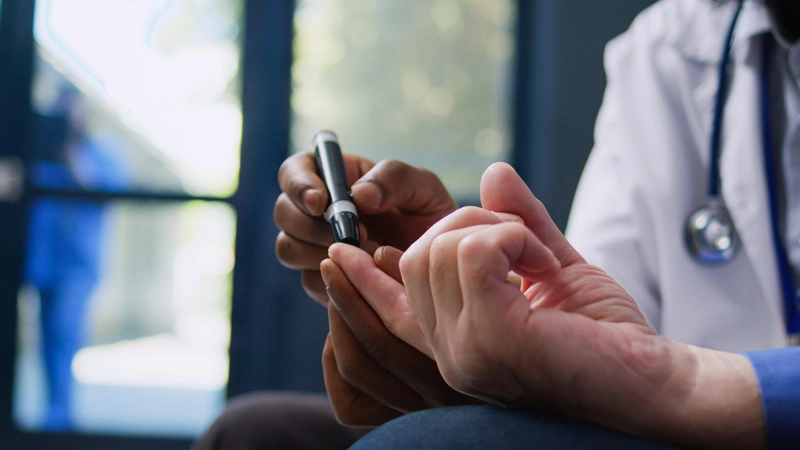- Published on: Apr 04, 2020
- 2 minute read
- By: Dr Rajan Choudhary
Let's Talk COVID-19: Can Chloroquine Really Work Magic?
In the fight against COVID-19, we're looking for good medicines. One medicine we're talking about is chloroquine. Can chloroquine do something amazing against the coronavirus? In this blog, we'll talk about chloroquine and learn about the chloroquine uses, what good things it might do, and the chloroquine side effects. We want to understand how chloroquine can help in the battle against COVID-19.
Understanding Chloroquine
Chloroquine is a medicine that's usually used to treat malaria. But now, scientists are looking closely at it because they think it might help fight the coronavirus. People who study science are talking a lot about whether it could be a big help in the fight against COVID-19. They're trying to figure out if it could be a game-changer in the battle against the virus.
Chloroquine's Role in COVID-19 Treatment
Scientists have been looking into whether chloroquine and hydroxychloroquine can help treat COVID-19. These medicines are famous for fighting viruses and have done well in stopping the virus from multiplying in lab tests. But figuring out if they work the same way in real life for people is a bit tricky.
Exploring the Potential Benefits
Scientists think that chloroquine might stop the virus from getting into our cells, kind of like putting up a barrier, which could make the infection happen more slowly. Also, some studies say it might help make the symptoms of COVID-19 not as bad.
Chloroquine Uses Beyond Malaria
Chloroquine has been around in medicine for a while. It was first used to fight malaria, but because it can do different things, doctors are now looking at whether it can also help with other illnesses. The big question is if it can change from being a medicine for malaria to a strong fighter against the coronavirus.
1. Can chloroquine, once a malaria hero, now fight COVID-19 too?
Think of it as a medicine with a strong track record against one bad guy (malaria) that researchers are now considering for a new mission against another foe (COVID-19). This idea has really caught the attention of scientists and got them excited.
2. Can Chloroquine Really Help Against the Coronavirus?
In the fight against COVID-19, we want to stop the virus from getting into our cells and making copies of itself. Some smart studies suggest that chloroquine could be like a superhero, slowing down this virus-making process. This gives us hope that it could be a good treatment.
Chloroquine's Many Jobs: More Than Just Malaria!
Chloroquine isn't just a hero in the fight against malaria; it's like a superhero that's taken on new challenges, including battling COVID-19. Picture it as a versatile warrior moving from the malaria jungles to the COVID-19 battlefield. To know how powerful it can be against the coronavirus, we need to understand all the different ways it can be used. It's like figuring out all the tricks a superhero has up its sleeve!
Chloroquine Side Effects: The Flip Side of the Coin
Discovering the good things about chloroquine is interesting, but we also need to look at the not-so-good part – the side effects. Just like any medicine, chloroquine has some things we should think about.
Handling Chloroquine Side Effects
In the study by Cochrane, they stress how essential it is to know about the possible side effects of chloroquine and hydroxychloroquine. These could involve stomach problems, skin reactions, and, in rare situations, heart issues. It's like weighing the good things it can do against these possible troubles, so you can make smart decisions about your health.
So, when we talk about dealing with COVID-19, think of chloroquine as one of the players in the game. It's like a potential superhero, but hey, even superheroes have their challenges. Studies, like the one by Cochrane, give us a peek into how chloroquine fights the virus, but we're still figuring out if it's the superhero we need in the real world.
In the middle of this COVID-19 mess, it's super important to keep yourself in the loop, look at what the scientists are saying, and understand that the answer we're all looking for might not be a one-size-fits-all kind of deal. Chloroquine, with its cool past and potential, is just one piece of the puzzle in our big effort to kick COVID-19 to the curb.
As we dream about a healthier future, chloroquine's journey is like an ongoing story. The talk about how it fits into the whole COVID-19 battle is a crucial part of our ongoing chat about keeping the world healthy.
Stay connected with us for the latest updates and exclusive content! Together, let's build lasting connections!
Read FAQs
A. Initially, drugs like chloroquine and hydroxychloroquine were considered potential treatments for COVID-19. However, their effectiveness in curing the disease is still under research, and no specific drug has been proven to cure COVID-19.
A. Chloroquine is believed to have potential benefits in treating COVID-19. It may inhibit the virus's ability to enter human cells, slowing down infection. Some studies suggest it could also reduce the severity of symptoms. However, these benefits are still being studied and are not conclusive.
A. Hydroxychloroquine, like chloroquine, is an antimalarial drug. It has been explored for its potential in treating COVID-19. Studies suggest it may have antiviral properties, hindering the virus's replication. However, its specific role and effectiveness in treating COVID-19 are still being investigated, and it's not proven to be a definitive cure.










